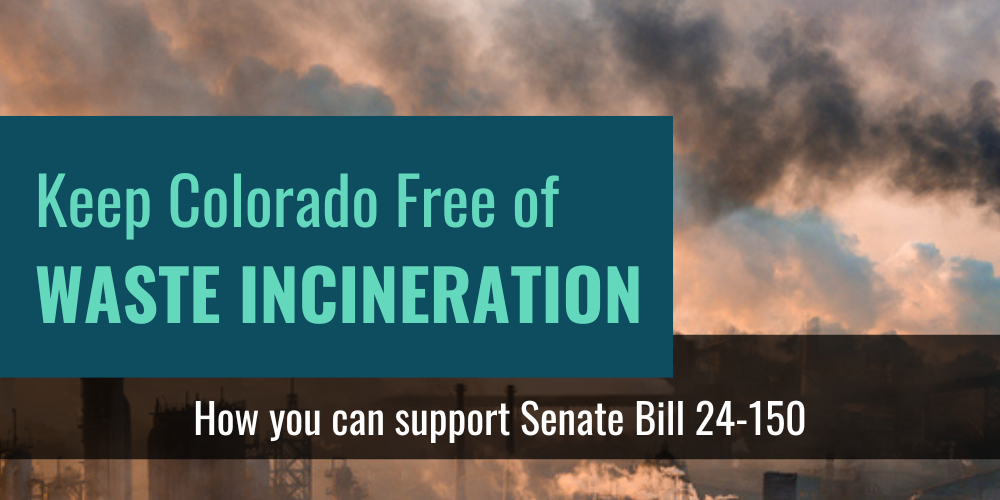Keeping Colorado Free of Waste Incineration

Incineration of plastic waste or the conversion of plastic waste to fuels—often referred to by ambiguous umbrella terms like “chemical recycling,” “advanced recycling,” and “molecular recycling”—is peddled as an advanced solution to the world’s growing plastic waste problem. Supporters promise that these processes convert plastic waste back into useful fuels or chemicals, closing the recycling loop.
However, these technologies aren’t recycling, but rather a form of incineration that perpetuates fossil fuel extraction and the resulting impacts on people and climate. Rather than taking responsibility with authentic solutions like reducing the use of single-use, disposable plastics or establishing recycling markets for them, the plastics industry is trying to sell false and harmful technologies that are notorious for releasing toxic pollutants, creating real impacts for public health and the environment.
Colorado currently has no waste incineration facilities in the state, and we want to keep it that way!
Colorado can take a bold step to block pollution with a critical anti-incineration bill. That’s why Eco-Cycle is championing Senate Bill 24-150, sponsored by Sen. Lisa Cutter and Rep. Meg Froelich. While SB24-150 passed the second reading in the Senate on Wednesday, March 13, an amendment we did not support was added to the bill removing a proposed ban on plastics-to-fuel from the bill. If passed as is, SB24-150 would still make Colorado the first state in the nation to ban the construction and operation of Municipal Solid Waste (MSW) incinerators. Keep informed on ways you can support this bill by signing up for policy updates on Zero Waste legislation here.
What is chemical recycling, waste incineration, and plastics-to-fuel?
Chemical recycling, waste incineration, plastics-to-fuel, and other terms championed by the plastics industry refer to various processes (including pyrolysis, gasification, and depolymerization) which break down plastics using heat, pressure, or solvents. The industry pushes these techniques as efficient ways to handle hard-to-recycle plastics. However, according to a report by the Global Alliance for Incinerator Alternatives (GAIA), the actual recycling rate of facilities claiming to use these technologies is alarmingly low. Most of the output from these processes is not recycled into new plastics but instead ends up as fuel for industrial processes, contributing to the fossil fuel economy and exacerbating climate change. While plastics-to-plastics chemical recycling may become viable, there is no place for dirty plastics-to-fuel processes in Colorado’s circular economy.
Impacts on People and the Planet
Waste-to-energy facilities are costly, inefficient, and waste more energy than they generate. They are also usually located in disproportionately impacted communities, emitting harmful pollutants and contributing to climate change and health risks.
The process’s energy input comes largely from nonrenewable sources, thus contributing to greenhouse gas emissions. According to GAIA, incinerators are only able to generate small amounts of energy while destroying large amounts of reusable materials. In contrast, Zero Waste practices such as recycling and composting conserve three to five times the amount of energy produced by waste incineration.
Waste incineration processes use and produce hazardous chemicals and generate hazardous waste. Toxic pollutants and hazardous wastes from MSW incineration and plastics-to-fuel facilities include dioxins, arsenic, mercury, and benzene, among many others. These toxins are correlated with health impacts, including cancers, neurological disorders, heart problems, and reproductive, immune, and respiratory disorders.
Nearly 80% of facilities that incinerate MSW, including the burning of plastics, are built in low-income and BIPOC communities. The lack of stringent regulations and oversight of chemical recycling plants only exacerbates risks to these vulnerable communities.
How YOU Can Help Keep Colorado Incineration-Free!
While waste incineration processes are often touted as an innovative solution to the plastic waste crisis, a deeper look reveals significant health and environmental drawbacks. Eco-Cycle and partners are championing Senate Bill 24-150 to keep Colorado free of Municipal Solid Waste incineration facilities and instead work to reduce plastic waste and find genuine recycling solutions.
- Read the fact sheet Say No to Polluting Waste-to-Energy Incineration and Plastics-to-Fuel Facilities in Colorado
- Lea la hoja informativa Diga no a las instalaciones contaminantes de incineración de residuos para producir energía y de plástico a combustible en Colorado
- Sign up for updates on actions you can take to support SB24-150!



























